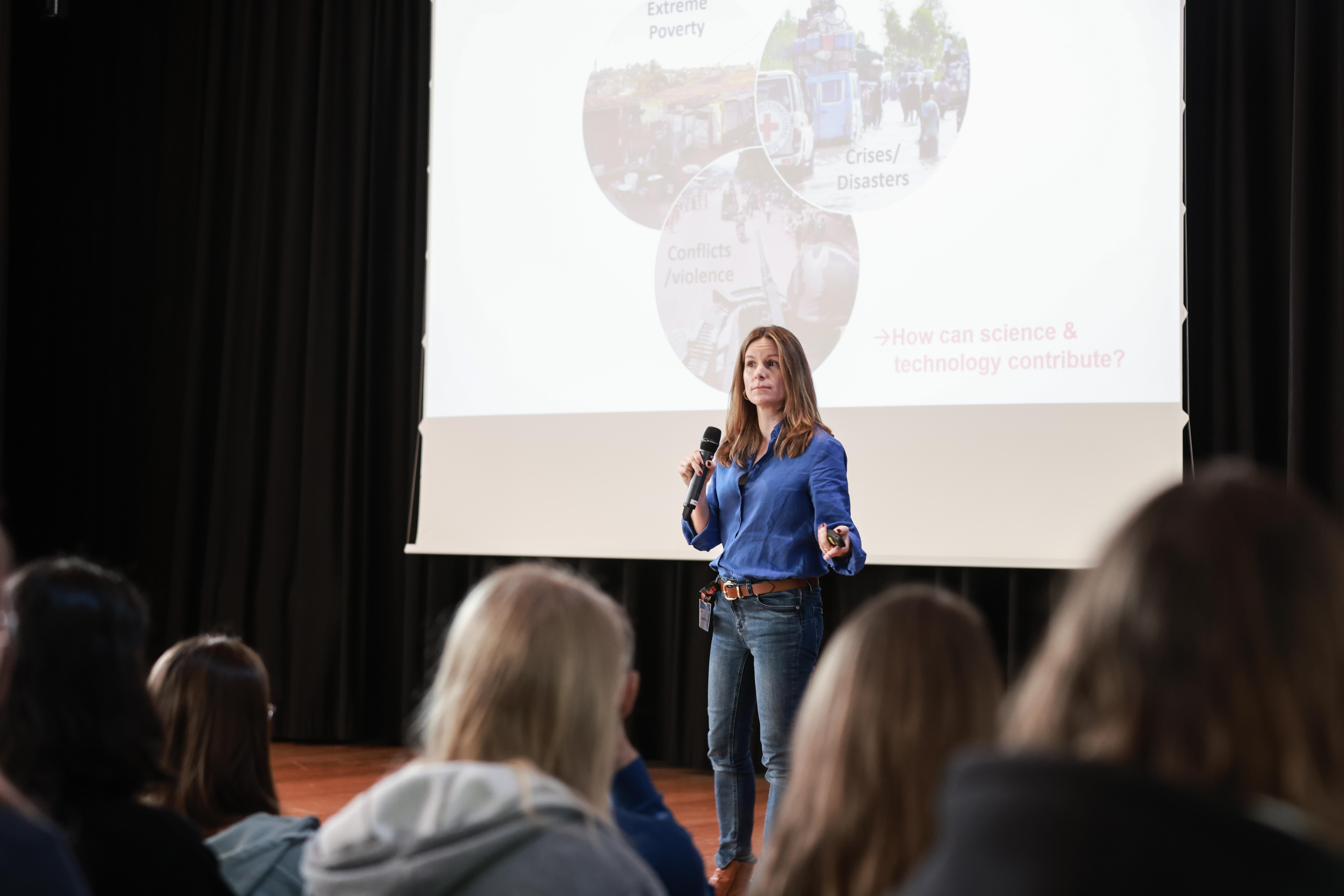A thematic day uniting sustainability, science and technology

© 2023 EPFL
Science, technology, and sustainable development are intrinsically linked areas and have an even stronger impact when taking an interdisciplinary and collaborative approach. Finding context specific solutions requires a subtle balance of these areas and approaches. Strengthening an open mindset is key to achieving that and is urgently needed to shift the needle towards a more sustainable world. How can we take the youth of today on a journey to embracing this and creating a better world for tomorrow?
The discovery journey through the world of science and technology
To sensitize high school students for these issues and approaches, EPFL’s Education Outreach Department (SPE) mobilized nearly 50 EPFL scientists and students to offer a thematic day in collaboration with and for the high school Kantonsschule Solothurn (KSSO) within the high school’s premises, allowing approximately 600 pupils from a variety of study orientations to explore these links.
This thematic day inserts itself in the long-standing partnership SPE has with KSSO, aiming at strengthening ties for STEM promotion and outreach, in this case with a focus on highlighting links between STEM and sustainability.
Barriers to accessing STEM fields is certainly higher for none-technical oriented students. For this reason, SPE puts particular emphasis on a holistic approach with diversified and tailored activities for awareness raising, covering areas such as computer, life or basic sciences, engineering or architecture, through workshops, expert presentations, experiments as well as booths with interdisciplinary project presentations. Participants also had the opportunity to talk with students and scientists, and learn more about the research areas as well as how studies at EPFL look like.
Understand to make a better impact
Nathalie Morandini, Head of the Sustainable Development Division at the EPFL EssentialTech Center introduced the program with a keynote on how to harness science and technology to drive sustainable development, peace promotion and humanitarian action. Using the example of a fragile context such as unreliable power grids, lack of infrastructure or limited financial resources, she took the audience on a journey on how the EPFL EssentialTech Center collaborates with the many professors, researchers and labs across the School, showing how EPFL transfers knowledge. She encouraged the students to be curious, to look beyond the visible, to question how conventional technologies also can be applied to extraordinary contexts and create high value and quality solutions.
It is interesting to talk to young people and show them that whatever career they choose, they will be able to have a better impact on society if they understand early on the importance of being curious and open to other realities, cultures and ways of thinking.
Connecting the dots – or where the journey took us to
It is cool to recognize certain terms we learn at school in these research projects, and we can make a connection between school and research.
Clean drinking water, extraction and reutilization of C02 to fight climate change, adapting the construction industry to climatic challenges by using sustainable materials and constructing seismic-resistant buildings or even re-thinking energy, its storage and use… these are all topics that are directly of concern to the youth. Getting a taste of how science and technology can contribute to solving these problems has impressed the students and made them see the application of these concepts to real-world problems in a different light, as Fynn a third year scholar mentioned.
I find the program very interesting and it gives an insight into areas and applications we don’t even know yet.
Two sides of the same coin: Jannik, a life sciences engineering student presented his biomedical student project which is more lab oriented and illustrated how introducing a given DNA sequence into bacteria in order to multiply it, is used to develop novel therapeutics, for instance for diabetes and prostate cancer research, thereby reducing to a certain degree animal experimentation. Julia on the other hand highlighted the engineering angle to biomedical research with her presentation of her project where she constructed an MRI-compatible ergometer to measure muscular flections, which is currently not possible in an MRI.
“With a scientific background I understand the science behind it. It was very well presented.
Impressed by what the EPFL-students have made
Two former KSSO-students, one studying Environmental Sciences and Engineering, the other Microengineering at EPFL were happy to return to their alma mater and reconnect as well as share their passion for science with their home crowd.
I find it impressive what the students have made out of their lives and what opportunities EPFL offers.
The day has not only raised the interest for these domains amongst potential future scientists and engineers, but also amongst the teachers who co-organized the event. A physics teacher was excited to see how EPFL brings these issues through connecting his students to people close to the actual projects, such as researchers or students, so as his pupils have a direct, hands-on immersion and are able to have peer-to-peer conversations. Equally important for him is the fact that it is a young generation reaching out to his scholars, which makes the connection more accessible.
“Young students, mixed genders, people who are close to the projects – that is what we need to spark the interest among our students.









